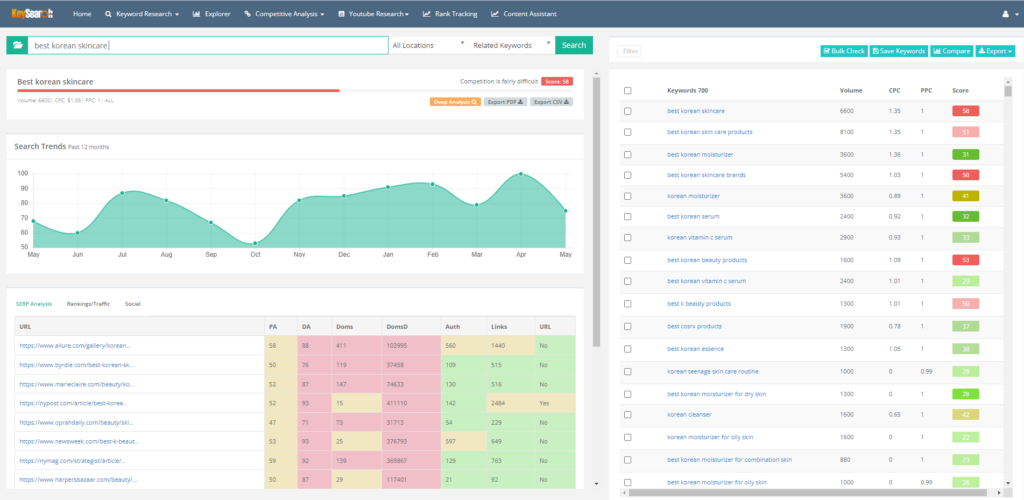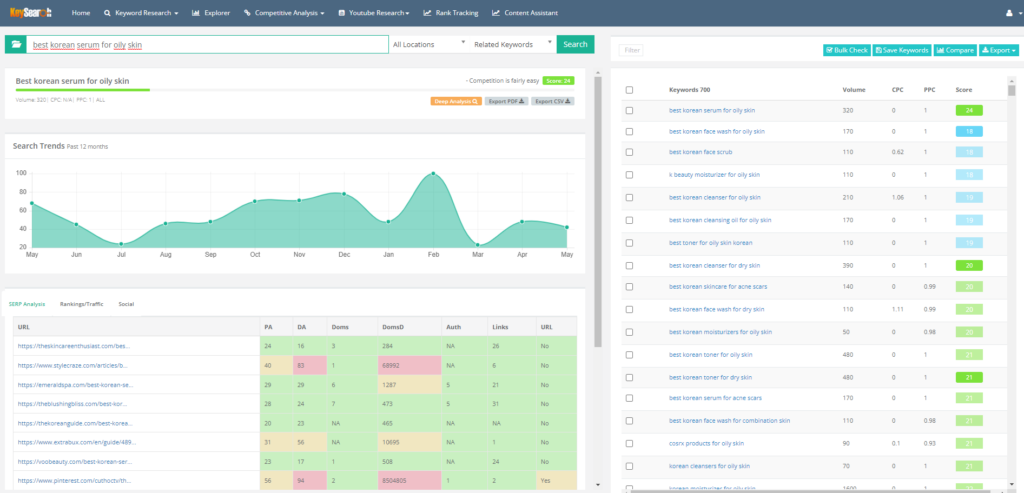Being a new blogger probably means you don’t know how to do keyword research for your blog correctly. Or maybe you do but you’re looking for more tips. This post is for you as I’m sharing with your how to perform keyword research for bloggers.
Ever since I started implementing these tips, my blog’s DA went from 8 to 14 in just 4 months. If you know DA you know that’s a huge increase. I’m still not even near where I want to be but if I keep doing things as I’ve been doing, I’ll be there in no time.
Performing keyword research for bloggers can seem daunting but it’s actually a lot easier than it appears.
If you want to increase your blog’s traffic and your DA, keep reading this blog post to find out how to do keyword research for bloggers.
RELATED: Pinterest Keyword Research Made Easy: How To Do It And Why It’s Important
Keyword Research For Bloggers
What is keyword research?

According to conductor.com, “Keyword research is the process by which you research popular search terms people type into search engines like Google, and include them strategically in your content so that your content appears higher on a search engine results page (SERP). Keyword research is a fundamental practice in search engine optimization (SEO).”
By adding certain keywords to your posts, they will be categorized by Google (and other search engines)and rank for those terms.
Being bloggers, we can make use of these rankings to drive a ton (and I mean a ton) of traffic to our websites just by using simple keyword strategies.
The importance of the perfect keyword
Having the perfect keyword for a blog post is the difference between having it rank number 1 on search, driving you a ton of traffic and (hopefully) money, and having it on the very last pages of Google where no one ever goes to, so they won’t read your post.
How to find the perfect keyword
The key to the perfect keyword is good search volume plus a low competition.
You want to find a keyword that people look for so you can get some of them on your blog.
Then there’s the competition: the first 10 results are your competition. Ranking on the first page for a keyword with a lower search volume is much better than ranking on the fourth page of Google for a super searched keyword. 75% of people never scroll past the first page of Google results so what’s the point of ranking somewhere other than the first page?
Good search volume + low competition = perfect keyword
Let’s suppose you want to write a blog post about the “best Korean skincare for oily skin”, but it turns out “best Korean serum for oily skin” is a much easier keyword to rank for. The content will still be about Korean skincare for oily skin, but it’s just a slightly different format that will bring you more traffic.


Keyword research tools
There are a ton of places you can perform your research, some paid and some free.
Free keyword research tools
- Google Keyword Planner
- Ubersuggest (3 keywords daily)
Paid keyword research tools
- Keysearch (my favorite and the one I use religiously)
- Moz
- Ubbersuggest (if you want more than 3 daily searches)
How to perform keyword research for bloggers: step-by-step
Brainstorm
To start your keyword research for bloggers, grab yourself a pen and paper and write down as many keyword variations related to the topic you want to write about as you can.
Find your monthly search volume
Take your keyword research tool of choice and type in each keyword you came up with. Next to them, jot down the monthly search volume of each one.
I personally like to target keywords with a monthly volume between 200 and 1500 because they have a good search volume and usually low competition. As you grow your blog, you can aim for keywords with a higher search volume, but if you’re just starting out, I recommend these numbers as a base.
Check out the competition
Go incognito on Google Chrome and type in your keyword: the first 10 results are your competition as I mentioned before.
If you choose to use Keysearch, you can do all of these steps directly on their website.
Go through each one of them and ask yourself:
Are there any blogs on the first 10 results?
If the answer is no, scratch that keyword and move on. If yes, that one is still a good candidate.
Is there at least 1 blog with a lower DA than mine?
You need to have at least 1 blog with a lower DA than yours ranking on the first page to ensure you have a chance at, at the minimum, beating that article and replacing it on Google.
I’m gonna be honest and tell you I don’t always follow this rule. Not because it’s not helpful, but because I’ve found that, in my case, aiming for keywords where all blogs have a higher DA than mine has worked for me and I still managed to get into the first page of Google.
How good is the content ranking on the first page?
Can you write a better and longer post, with more information that lines up exactly with what the reader is searching for? If the answer is yes, congratulations: you’ve got your keyword.
“Wait, but what if I have more than 1 keyword that fits all the criteria?”
Well, you just need to choose the one that most benefits you. If they all do, write different articles for each one!
Where to place the keyword
Now that you’ve got your perfect keyword, it’s time to start writing. In order to rank for the keyword, it needs to be present in your article. What I found works best is to place the keywords on:
- Title
- URL
- ALT Text
- Headings (I usually go for heading 2)
- Scattered (in a natural way) through the text. The amount depends on how big the article is.
The form you have selected does not exist.
What comes next?
After you hit publish your blog post, it takes a while for Google to pick it up and rank it. What I recommend you to do is wait about 6 months and re-evaluate then (but keep promoting the blog post on Pinterest, Facebook, Twitter, Instagram, etc)
After six months, check your ranking on that post. If you’re still not on the first page, see what changes you can make to the post for that to happen: add more information, add more links, take out unnecessary things, etc.
So that’s how to perform keyword research for bloggers. Let me know how you usually do your keyword research in the comments!
If you liked this post, you might also like:
- 20 Amazing Pinterest Templates for Bloggers
- How To Update Old Blog Posts + Free Checklist
- 100 Amazing Blog Post Ideas + FREE EBOOK
- Why Workflows Are Important + Free Blogpost Workflow Checklist
FOLLOW ME:
INSTAGRAM | PINTEREST









One Comment